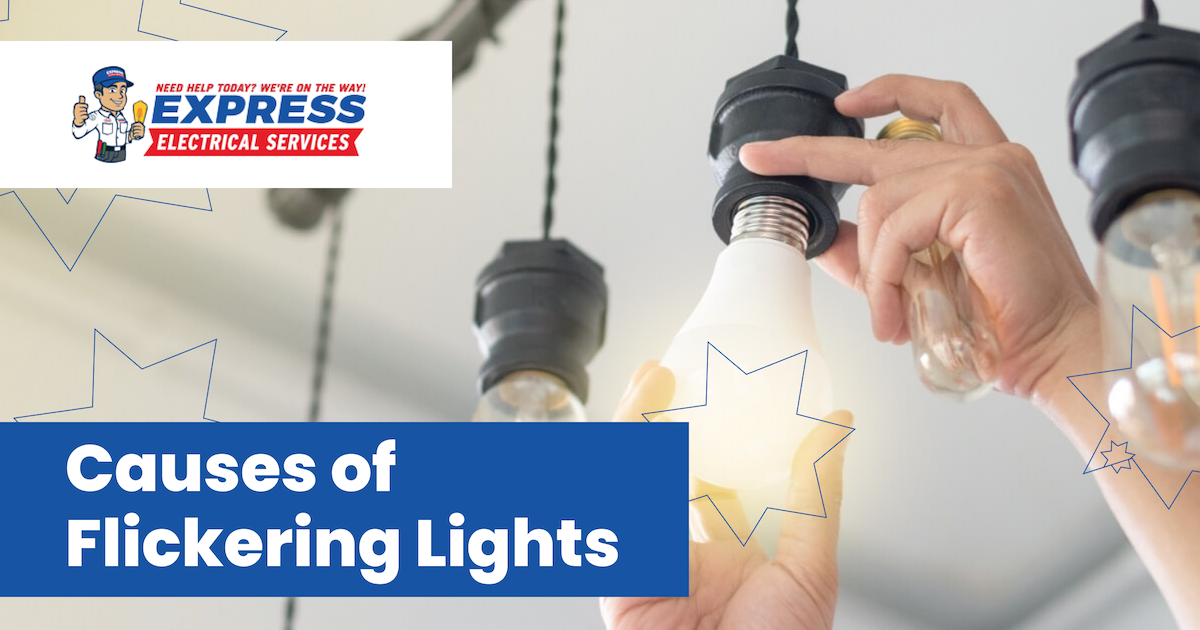Causes of Flickering Lights

Do you find yourself irritated while walking around the house, trying to cook, read a book, or clean? Flickering lights can be more than a harmless annoyance. Fluctuations in voltage can cause light bulbs and fixtures to flicker or dim momentarily (this often means there’s an electrical problem). For more detail, we’ll explain some reasons why lights are flickering.
A Problem with the Bulb
Check to see if the bulb is loose. If so, then screwing it in tighter may resolve the flickering. But first, turn the light off and wait until the bulb cools enough for you to touch it. Only incandescent or compact fluorescent bulbs will flicker if they’re loose. An LED bulb will need to be changed to remedy the problem.
Type of Bulb and Flickering
Flickering lights may not be due to a circuit problem if a fluorescent bulb changes intensity when the room is cold. It can also flicker a bit when powering up. Both fluorescent and LED light bulbs can flicker if installed with an incompatible dimmer. Conventional dimmer switches are intended for incandescent and halogen bulbs; LED bulbs require a specialized LED dimmer.
Fixture/Bulb Incompatiblity
Not every light fixture works with every type of bulb. For example, LED bulbs may not work correctly when installed in a ceiling fan. An LED bulb may also not work with a certain light switch, especially one with a dimmer controller. Change it back to an incandescent bulb to see if it works and deduct any other potential culprits.
A Wire or Connection Is Loose
If the flickering started subtly and is getting worse, you may have loose wiring. The wiring may be outdated or worn out, or perhaps it was installed incorrectly. Loose connections can cause a wire to overheat, which can lead to trouble. Contact an electrician as soon as possible to avoid fires, electrical damage, or a total loss of power.
The Circuit Is Overloaded
An overload is highly likely if your lights start flickering when you turn on the AC, microwave, vacuum cleaner, or dishwasher. Some appliances and devices draw large amounts of power. You may need a new circuit or electrical upgrade if the flickering lasts more than a few seconds or occurs constantly.
The Fixture Itself Is Faulty
A bulb can flicker because there’s damage to the fixture. Does it appear broken or rusted? If so, it should be replaced to restore function and safety. But you can first try switching the bulb with a working one. If the flickering still happens, it’s time to call an electrician to install a new fixture.
How Dangerous Are Flickering Lights
In addition to the problems mentioned above, flickering lights can indicate a problem with your electric utility service, the meter box, or the main service cable connection. Only if the issue is with the bulb or a dimmer switch, should you try to fix the problem yourself. Bigger issues must be handled by a licensed electrician. They have the knowledge, tools, and equipment to safely deal with common problems and avoid shock, electrocution, or an electrical fire. Having said that, flickering lights should always be taken seriously.
Contact Express Electrical Services
Serving Southern California, our electricians are trained and equipped to find the source of any problem and can quickly fix your flickering lights. An underlying issue may be present and require re-wiring, updating the circuit breaker panel, or performing a major electrical repair. You can reach us in an emergency 24/7. Request service online or call 323-727-7799.
